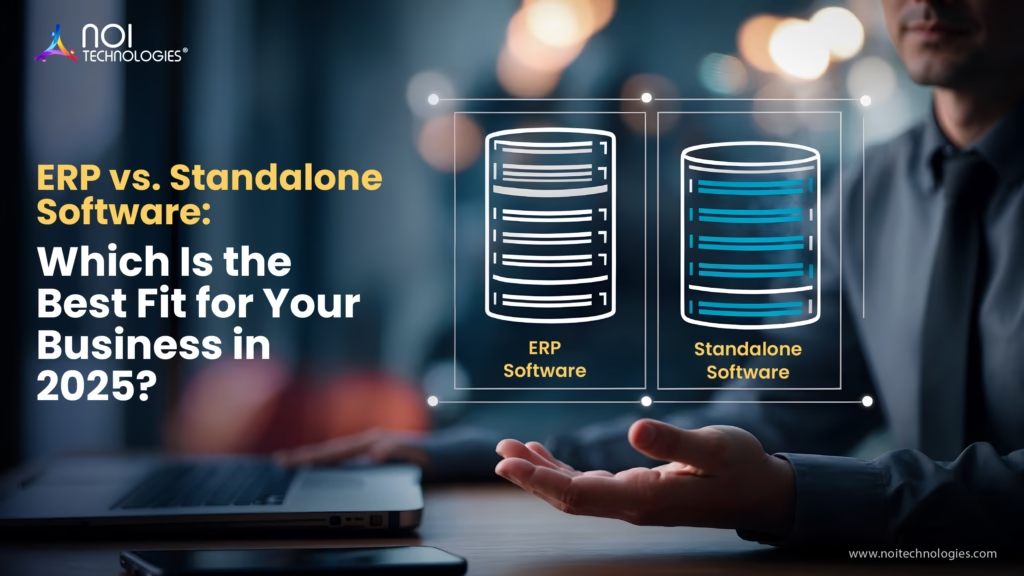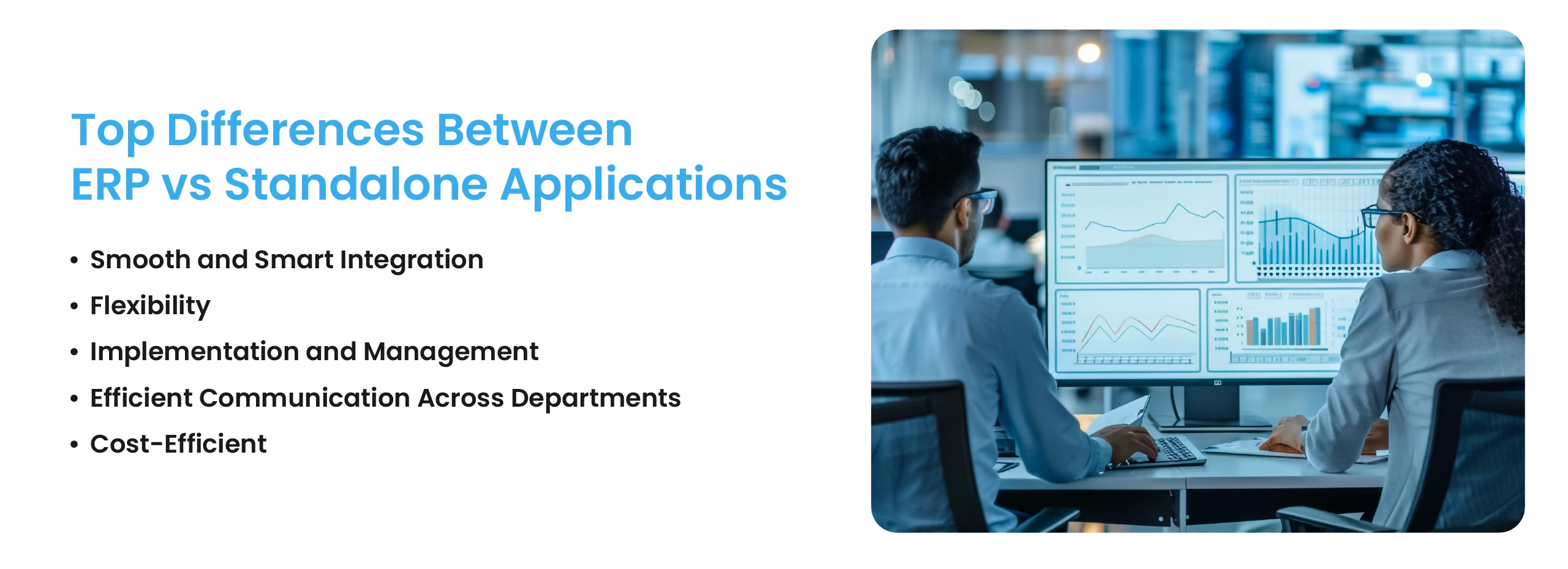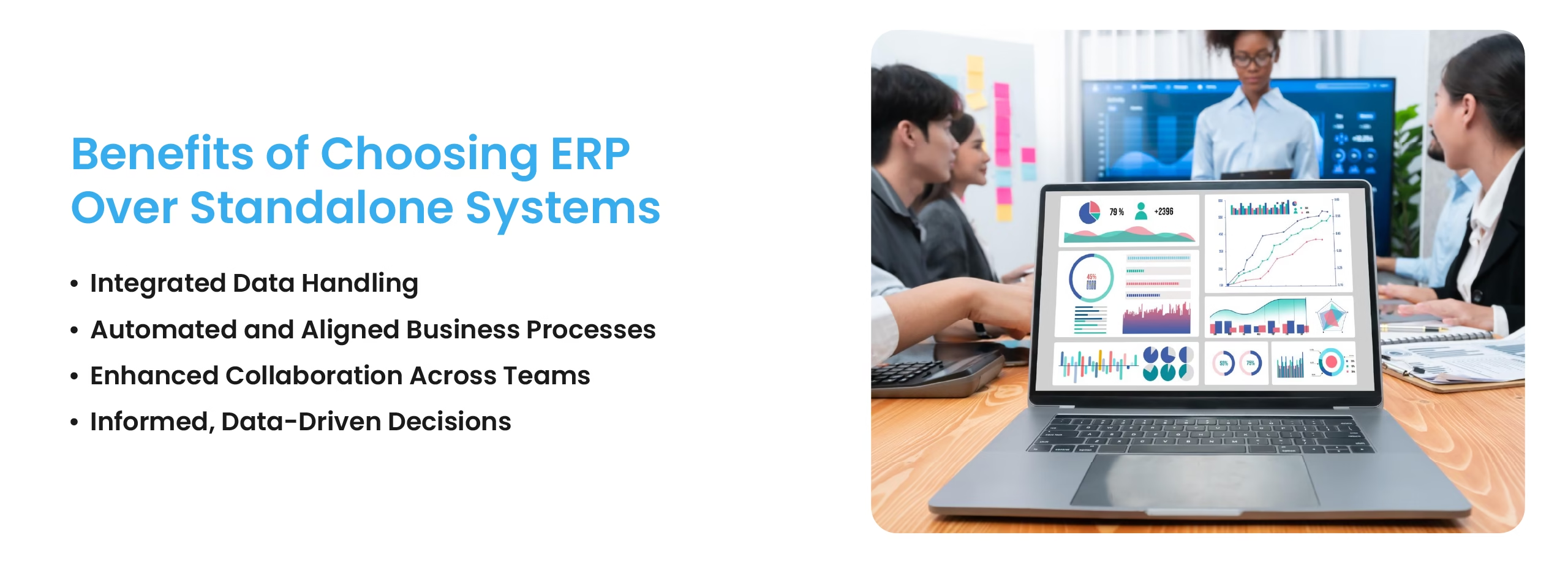
ERP vs. Standalone Software: Which Is the Best Fit for Your Business in 2025?
ERP vs. Standalone Software: Which Is the Best Fit for Your Business in 2025? https://www.noitechnologies.com/wp-content/uploads/ERP-vs-Standalone-4.avif 2560 1441 Visvendra Singh https://secure.gravatar.com/avatar/824969161f6ef5f9816028e493f8b0c199f12b9bdf61433328e6dada610d186b?s=96&r=gMost modern enterprises today rely on digital tools to align and automate business processes, improve performance, optimize resources and costs, and enhance decision-making. They have two choices to choose from: ERP software and a standalone system. Their choice would depend on business size, budget, and operational complexities.
In this article, we’ll explore the advantages and drawbacks of ERP vs standalone software tools to help you decide the best fit for your organization.
ERP vs Standalone Software: Key Differences Explained
You might be confused or thinking about the difference between an enterprise resource planning system (ERP) software and standalone business systems. Many businesses experience difficulties in making a decision whether to implement a dependable ERP system or rely on individual, standalone tools. Fret not! In this blog, we will share the differences between these two in detail. Luckily, with the right information, making this decision becomes much easier and efficient. To begin with, ERP software is a comprehensive business management solution that integrates key core functions such as finance, HR, inventory, and customer management into a single, unified system.
Alternatively, standalone business applications are designed to address specific needs, offering limited functionality with no efficient integration, and they operate independently from other systems.

Smooth and Smart Integration Across Business Functions
ERP software effortlessly connects core business functions such as HR, sales and distribution, accounts, marketing, and manufacturing, among others, into one system, which means all departments can easily share and access information. In contrast, standalone business applications can only handle one specific function (like accounting or others) and don’t connect well with other parts of the business. ERP systems also allow for ongoing improvements, while standalone tools are more limited in their features.
Flexibility and Scalability for Modern Enterprises
Companies need to be flexible to lead in the ever-dynamic business landscape. ERP software supports collaboration and coordination between departments and even with external business partners. ERP systems are centrally managed, which ensures better control and best usage within the entire organization. Whereas Standalone applications are usually rigid and only work within a specific department. They aren’t built to support wide or long-term business needs.
Implementation and Management: ERP vs Standalone Systems
Setting up an ERP system requires deep planning, money, and support from top management and project management. Additionally, it needs proper training and process changes to succeed. On the other hand, a standalone app is easy to install and usually needs the attention of the specific department.
Efficient Communication Across Departments
ERP systems smooth integrations across various departments, making it easy and quick for multiple departments to share information and communicate with each other. For example, a purchase report from the procurement team can quickly be seen by the finance department. Many ERP platforms also include communication tools to support better communication. With standalone software, sharing information often requires manually sending emails or printing reports, which often slows things down.
Cost-Efficiency: Long-Term Value of ERP vs Standalone Tools
While standalone apps may seem cheaper initially, they can become expensive when each department needs its own separate system. ERP software is more cost-effective as they are flexible, scalable, and companies can start with the modules they need and add more later. Adding a new ERP module is usually cost-efficient and easier than setting up a brand-new standalone tool.
Benefits of Choosing ERP Over Standalone Systems
One great reason for small, mid, or large businesses to choose ERP systems is that they’re designed to grow and expand with your business. You can begin with the modules you need today, maybe just billing and inventory, and add more modules later as your business grows. Core operational systems such as CRM, project management tools, e-commerce, and other applications can all be connected effortlessly. The best part? It’s an all-in-one, centralized solution.
Conversely, with standalone tools, you might end up using five or six different apps through different platforms as your needs grow. Managing them all together can be stressful. You’ll also drain time training your team to use different software for each task.

Let’s explore the key advantages that make ERP software a smart and crucial investment for growing companies:
- Integrated Data Handling: One of the robust features of ERP systems is the centralized database. Instead of juggling multiple apps with ineffective data, ERP consolidates all your business information into a single platform.
- Real-time visibility ensures teams have access to correct and up-to-date information to make data-driven, informed decisions.
- Consistent and accurate data across departments removes the confusion and chaos caused by discrepancies found in standalone tools.
- Eliminates redundancy and duplication, boosting data accuracy across the departments.
- Automated and Aligned Business Processes: Efficiency is key to business growth and long-term success, and ERP helps by automating complex tasks and organizing processes.
- Automated tasks reduce manual data entry mistakes and human biases.
- Systematized methods across several departments ensure that every department follows the same processes, eliminating inefficiencies and misalignment.
- Informed, Data-Driven Decisions: With all your business data in one platform, ERP systems unlock deeper, valuable insights through powerful analytics and reporting tools.
- Generate detailed, real-time reports on financials, operations, and performance, and more.
- Utilize data analytics to analyze trends, predict demands, and plan more strategically.
- Enhanced Collaboration Across Teams: ERP software removes the data silos that often exist between departments using separate tools.
- Cross-functional coordination allows teams, from finance to sales, to communicate more clearly.
- Features like shared dashboards and internal messaging tools foster communication and transparency.
- Everyone works from the same data means enhanced trust and teamwork.
ERP Growth or Standalone Ease: Which One Would You Choose?
Upgrading to a smart, robust business system isn’t just about keeping your operations running smoothly; it’s essential for growth and expansion. If you’re spending too much time switching between tools, fixing errors, or doing repetitive manual tasks, it’s time for a switch.
This is where ERP software becomes one of the finest choices. If your team wants to enhance communication, gain valuable insights, and manage tasks more efficiently, then ERP software built on Apache OFBiz or the Moqui Framework is are future-ready and powerful solution.
Connect with our experts at NOI Technologies LLC today, and let us build the perfect ERP solution for your business!
ERP Vs. Standalone Software: Frequently Asked Questions
1. What is the prime difference between ERP software and standalone business applications?
ERP software integrates various key business functions like finance, HR, inventory, and sales into one centralized system, while standalone applications are built to handle only a specific function and typically run independently from other systems.
2. Which system is more expensive between ERP systems and standalone applications?
While the initial investment in ERP may be higher, it often proves to be more cost-efficient in the long run by reducing the need for multiple systems, which requires high-cost implementation. Additionally, it lowers the risk of data errors and operational inefficiencies. Standalone apps may seem cost-effective initially, but they can become expensive when each department needs its own separate system.
3. Why should you not stick to standalone applications as your business scales?
As your business scales, standalone apps can lead to data silos, increase manual intervention, reduce visibility, and make detailed reports more complex. You may also end up spending more time and money managing and training staff on multiple systems.
